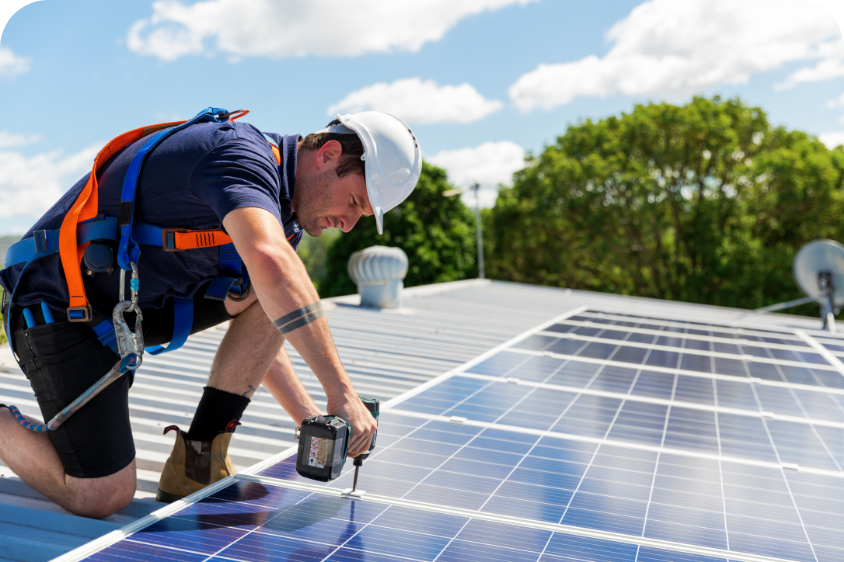Switching to solar isn’t just a trend—it’s a lifestyle choice that more homeowners are embracing every year. Rising energy costs, the push toward sustainable living, and the desire for independence from traditional power companies are all driving factors. But what does it really mean to install solar panels at home, and why is it such a smart investment? Let’s break it down in simple, everyday terms.
Why Solar Power Makes Sense for Homeowners
Think about your electricity bill. For many families, it’s one of the biggest monthly expenses—right after housing costs and groceries. Now imagine reducing that bill to a fraction of what it is today, or in some cases, eliminating it altogether. That’s the kind of change solar power can bring.
Solar energy works by capturing sunlight and turning it into electricity. Since the sun is a free and renewable source of power, you’re no longer fully dependent on the grid. This means that while others worry about rising electricity prices, you’re generating your own supply from your rooftop.
Take the example of a young family with a three-bedroom home. Before solar, their summer electricity bills often spiked due to the constant use of air conditioning. After installation, not only did those bills shrink dramatically, but they also started saving enough each month to put extra money toward family vacations.
The Long-Term Financial Benefits
Installing solar panels does involve upfront costs, but many people don’t realize how quickly the investment pays for itself. Think of it like buying energy in bulk today so you won’t have to pay inflated prices tomorrow.
In industries such as manufacturing and farming, companies that consume a significant amount of power have been among the first to adopt solar energy because the savings add up substantially over time. For homeowners, the same principle applies. Depending on the system size and energy usage, many families see their solar systems pay for themselves within five to eight years. After that, it’s essentially free electricity for the life of the panels, which often last 25 years or more.
On top of that, governments in many regions provide rebates, tax incentives, or feed-in tariffs where you can sell excess electricity back to the grid. This further boosts your return on investment and can even turn your home into a mini power station.
The Environmental Impact You Can Be Proud Of
It’s not just about saving money—it’s about making a difference. Every time you use solar power instead of electricity generated from coal or gas, you’re reducing your carbon footprint.
Imagine if every household in a neighborhood switched to solar. Collectively, that would mean fewer greenhouse gas emissions, cleaner air, and a healthier environment for kids to grow up in. For context, switching to solar at home can have the same impact as planting hundreds of trees over the course of the system’s lifetime.
Even small steps matter. Just as people are swapping single-use plastics for reusable alternatives or opting for public transportation over cars, homeowners who install solar panels are contributing to a broader movement toward sustainability. It’s a decision that goes beyond the individual household—it helps future generations.
(For a broader perspective, here’s more about the global shift toward renewable energy.)
Choosing the Right Solar System for Your Home
Not all solar installations are the same. The right system depends on factors such as the size of your roof, your daily electricity usage, and your long-term goals. Some homeowners opt for smaller systems simply to cut their bills in half, while others invest in larger setups and battery storage to achieve complete energy independence.
Here’s where professional guidance matters. A proper assessment ensures you don’t overinvest in equipment you don’t need, and at the same time, you won’t be left wishing you had installed a bigger system down the road.
If you’re considering your options and want to explore reliable services, you can learn more about Residential Solar Installation in Melbourne to see what’s available for households looking to balance affordability, performance, and sustainability.
Looking Ahead: The Future of Solar at Home
Solar energy is becoming more affordable and efficient every year. Battery technology is improving, which means more homeowners will soon be able to store extra power during the day and use it at night without relying on the grid. Electric cars can also be charged using solar energy, tying together household and transportation savings in a single system.
Think of it this way—just as smartphones became a standard household tool in less than two decades, solar technology is heading in the same direction. What feels like a “big upgrade” today will likely become the norm in the near future. By installing solar panels now, you’re not just catching up—you’re staying ahead.
Final Thoughts
Residential solar installation is more than just a way to lower bills—it’s an investment in financial freedom and environmental responsibility. Whether you’re a growing family, a retiree wanting lower expenses, or someone simply passionate about sustainability, solar offers benefits that last for decades.
When the sun rises each morning, you have a choice: continue paying for electricity as usual or harness that energy to create a brighter, cleaner, and more affordable future. With solar, the power—literally—is in your hands.






